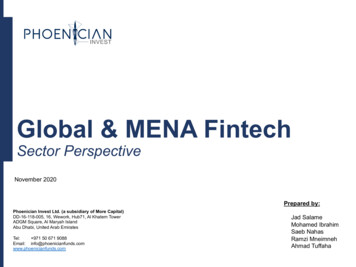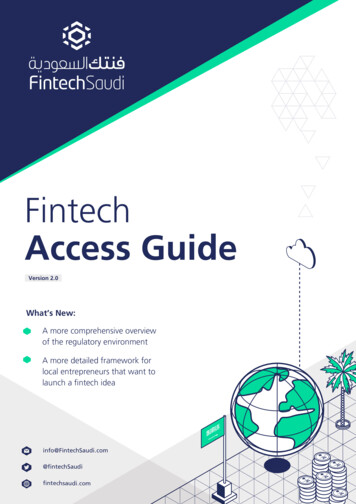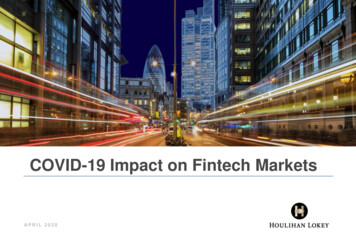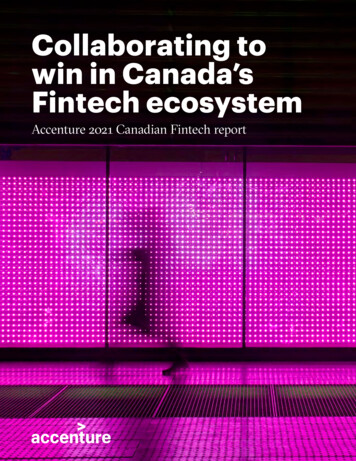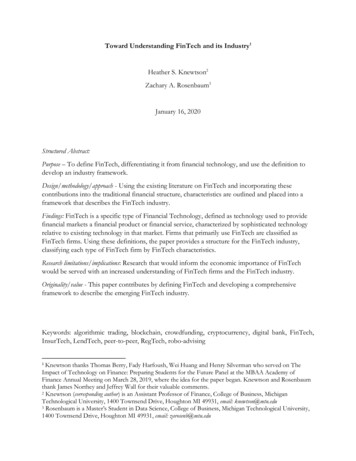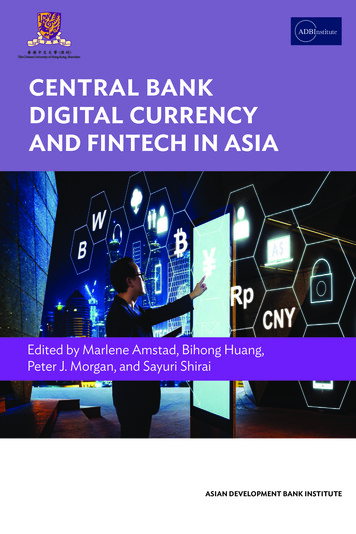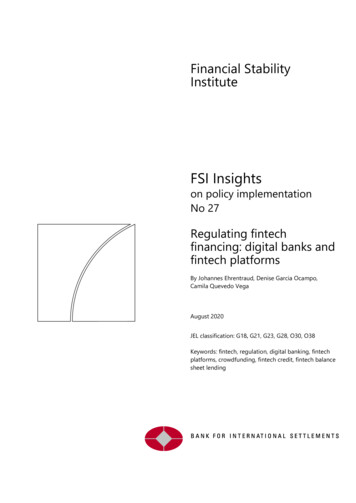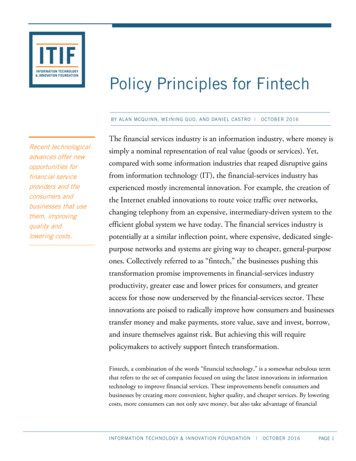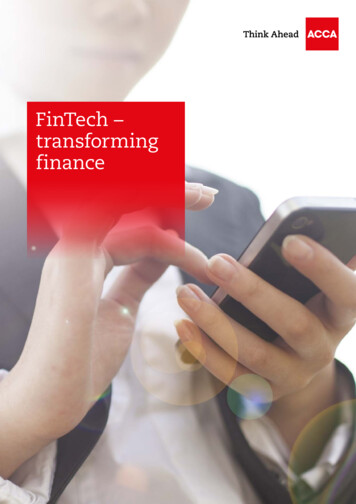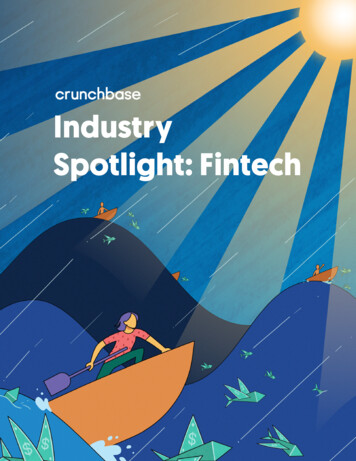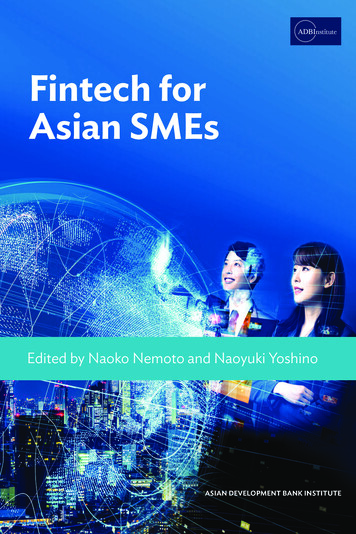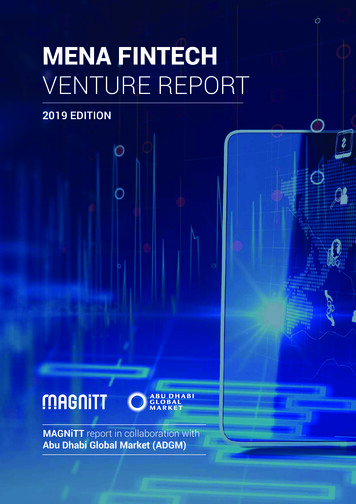
Transcription
2019 MENA FinTech Venture ReportMENA FINTECHVENTURE REPORT2019 EDITIONMAGNiTT report in collaboration withAbu Dhabi Global Market (ADGM)1
22019 MENA FinTech Venture ReportFOREWORDABU DHABI GLOBAL MARKET (ADGM)FinTech in MENA has seen immense growth in a very shortperiod of time.Digitalisation of financial services is happening at an unprecedented pace. Frompayments, banking, financial advisory, capital market and insurance, deploymentof financial technology (Fintech) via artificial intelligence, data analytics, cloudand blockchain have reimagined the financial services sector resulting ininnovation, efficiency and greater financial inclusion.RICHARD TENG,CEO OF FINANCIALSERVICESREGULATORYAUTHORITY (FSRA),ABU DHABI GLOBALMARKET (ADGM)Against this backdrop, FinTech in MENA has seen immense growth in a veryshort period of time. Based on the MENA FinTech Venture Report by ADGM/MAGNiTT, FinTech is the top industry across MENA by deals in 2018 and 2019.The statistics also revealed that the UAE is MENA’s largest FinTech Hub andaccounts for the highest amount of funding in the same period.This year, we sit on the precipice of ADGM’s fourth anniversary as an InternationalFinancial Centre and FinTech hub. ADGM has put innovation and technology atthe forefront of its entire regulatory framework and business. As a progressivefinancial services regulator, ADGM remains resolute in enabling FinTech torealise its full potential and also in providing modern and effective markets.Treading on uncharted territory in the region, ADGM made the region’s first moveinto FinTech with the launch of its Regulatory Laboratory, a FinTech licencingregime to permit live testing in 2016. To boost the FinTech ecosystem, ADGMinitiated the region’s first venture capital fund framework in 2017, a proportionateand risk-based approach to regulate this space. Year after, we introduced acomprehensive crypto-asset regime in 2018, which puts a robust frameworkaround crypto activity. This year, we launched regulatory frameworks for digitalbanking, digital securities, robo-advisory, and the use of APIs. We are also excitedto launch out first batch of applications for the ADGM Digital Lab, a cloud-basedplatform to facilitate collaboration and FinTech trials between incumbents andstartups. On the talent development and professional development front, theADGM Academy has and will continue to partner with strategic internationaland local academic institutions and professional associations to support theFinTech ecosystem.The Abu Dhabi government and major entities have also made several significantdevelopments this year. Mubadala, Softbank and Microsoft set up Hub71, a globaltechnology ecosystem that brings together key enablers for startups to succeed.Additionally, as part of the Ghadan 21 initiative, the Abu Dhabi Investment Officehas launched the AED 535 million Ghadan Ventures Fund to attract startups andventure capital funds to Abu Dhabi. The MENA FinTech Association, an industrychampion for the MENA FinTech community, is headquartered in ADGM.Collectively, all our efforts have created visible results as shown by this report,which underlines the UAE’s role as the regional FinTech hub. Abu Dhabi, as thecapital of the UAE and ADGM as its financial centre are at the heart of thesefinancial industry transformation and FinTech developments in the region. ADGMwill do what it takes to maintain an innovative, well-regulated and sustainablemarketplace for investors and FinTechs to succeed.
32019 MENA FinTech Venture ReportFOREWORDMAGNiTTFinTech has many similarities to transport & logistics: alarge addressable market, the ability to disrupt historicalbusiness models and solutions that can cross borders.Fintech has become somewhat of a buzzword in the region. Everywhereyou go, FinTech is the hot subject – this wasn’t historically the case. As withany emerging startup ecosystem, infrastructure industries are the first to getdisrupted. The Middle East and North Africa region is no different, as technologyallows for efficiency in what have historically been inefficient sectors.When you look at the big tech solutions of the region, Careem solved for theproblem of picking up and dropping off people. Souq, an e-commerce website,saw huge success because of their delivery service, providing last-mile deliveryto your door. In e-commerce, transport and logistics, we have historically seenPHILIP BAHOSHY,CEO & FOUNDEROF MAGNITTthe highest number of deals and the largest amount of funding.With time, these industries got crowded – nowadays, we see further specializationand M&A taking place in these industries. This has opened the way for a FinTech.At its core, FinTech in the region has many similarities to transport and logistics:a large addressable market, the ability to disrupt historical business modelsusing technology, and solutions that can cross borders.With other industries, there are examples of international solutions that can beadopted regionally. Not surprisingly, this is where we have seen the most growthin FinTech as well: payments and remittances are – understandably – the mostinvested in solutions. Not blockchain and crypto, but large identifiable problemsthat can be solved with tech adoption.The best part for FinTech startups is that the industry is at the top of allgovernment and central bank agendas. They understand the importance ofmodernization of processes, and are providing sandboxes and other incentives towork with them and grow their solutions. However, similar to all MENA startups,scale is the name of the game. Founders need to navigate multiple regulatoryand jurisdictional challenges to build successful companies in this space. Theground, however, is currently fertile and the interest is extremely high.This report serves as an overview of the growing FinTech space as it continuesto grow across MENA.
42019 MENA FinTech Venture ReportEXECUTIVE SUMMARY 237MINVESTED IN MENAFINTECH STARTUPS2015 – 2019 YTD181FINTECH RANKED 1ST ACROSSMENA BY NUMBER OF DEALSIN 2018 AND 2019 YTDREGIONAL DEMOGRAPHICSAND GOVERNMENT SUPPORTPROPEL FINTECH GROWTHPAYMENTS ANDREMITTANCES IS THE TOPSUB-INDUSTRY WITHINFINTECHTHE UAE IS MENA'SLARGEST FINTECH HUB75 DIFFERENT ENTITIESINVESTED IN MENA-BASEDFINTECH STARTUPS IN THELAST 5 YEARS1N. OF DEALS IN MENAFINTECH STARTUPS2015 – 2019 YTD1STINDUSTRY RANKINGBY N. OF DEALS2018 AND 2019 YTD Ranking – FinTech surpassede-commerce and logistics in 2018 as themost invested industry by number of deals Total Funding – Total funding stilllags behind others, however, with mostinvestments at the early stage2 Drivers – 6 key drivers to FinTech growthincl. internet penetration, regulatorysandboxes & government funds Government Support – Regionalinitiatives include 9 regulatory sandboxesand 5 FinTech funds across MENA3 Top Verticals – Payments & remittancesstartups have historically received thehighest share of FinTech deals Emerging Trends – Other FinTechtechnologies, including blockchain, arehigh on government agendas4 Regional Hub – The UAE houses thelargest number of FinTech startups &accounts for the most amount of funding High Growth – 39% yearly growth inFinTech startups since 2012 highlightsinterest from founders & investors alike5 Accelerators – 57% of FinTechinvestments in 2018 & 2019 YTD havebeen by accelerators International Interest – 14% of investorsin FinTech have come from outside of theMENA region
52019 MENA FinTech Venture Report1.FINTECH VENTUREFUNDING TRENDS
62019 MENA FinTech Venture Report1.FUNDINGEVOLUTIONA total of 237M has been invested in 181 deals since 2015 in MENA-based FinTech startups.2017 was the breakout year for FinTech venture investment across MENA, with largeinvestments including Network International ( 30M), PayTabs ( 20M) and Souqalmal ( 10M).Annual number of deals (#) and total funding ( ) in MENA-based FinTech startups, 2015 – 2019 YTDDisclosed FinTech FundingMAGNiTT Undisclosed Funding Estimate51Deals46 122M38 12M2818 44M 30M 23M 18M 18M 18M 109M 42M 25M20152016201720182019 YTDQuarterly number of deals (#) and total funding ( ) in MENA-based FinTech startups, Q1 2018 – Q3 2019Disclosed FinTech FundingMAGNiTT Undisclosed Funding EstimateDeals24201813 22M877 8M 8M 16M 12M 6M 8M 21M 8M 6M 14MQ1 2018Q2 2018Q3 2018Q4 2018Q1 2019 2MQ2 2019 10MQ3 2019KEY TAKEAWAYS# 1.8M7%2019 YTD has seen more FinTech investments than any previous yearThe average deal size for FinTech Investments between 2015 and 2019 YTDPercentage of total MENA startup funding attributable to FinTech between 2015 and 2019 YTD
72019 MENA FinTech Venture Report1.INDUSTRYCOMPARISONIn 2018, FinTech overtook more traditionally invested industries, such as e-commerce and transport, andbecame the most popular by number of deals across MENA. Despite this, funding amounts are still low,given that investment has predominantly been at the early stage of investment.Top 7 industries by number of deals (#), 2018 – 2019 YTD978465FinTechE-CommerceDelivery &Transport59Food &Beverage52ITSolutions4641HealthcareEducation 51M 39MIT SolutionsProfessionalServicesTop 7 industries by total funding ( ), 2018 – 2019 YTD 346M 232M 223M 74MDelivery &TransportE-CommerceReal EstateFinTech 71MRenewableEnergyKEY TAKEAWAYS1stWith saturation in the e-commerce and logistics industries, FinTech has now surpassed all otherindustries by deals since 20184thFinTech ranks only 4th by total funding, however, driven by the fact that these deals havepredominantly been made by earlier-stage accelerator programs13%Percentage of all deals in 2018 and 2019 YTD attributable to FinTech, while the industry accountsfor only 5% of total funding
82019 MENA FinTech Venture Report1.FUNDING STAGEBREAKDOWNFinTech, while quickly developing, is still a nascent industry within MENA startup scene. The majorityof deals have been at early stage. However, notable later stage transactions include: 30M for NetworkInternational, 20M for Paytabs and 10M for Souqalmal.Percentage (%) of total FinTech deals by funding stage, 2015 – 2019 YTDEarly Stage - Investments in small, newly established startupsSeries A - Investments in startups that gain traction after early stage investmentSeries B - Investments in quickly scaling later-stage startups, after Series 82019 YTDPercentage (%) of total FinTech deals by accelerator and non-accelerator, 2015 – 2019 YTDAccelerator DealsNon-Accelerator 2019 YTDKEY TAKEAWAYS81%Percentage of all FinTech deals between 2015 and 2019 YTD that were early stage investments59%Percentage of all FinTech deals attributable to accelerators in 2019, which is a significant increasefrom just 7% in 20158%Series B and later stage deals accounted for 8% of total deals in 2019 YTD, as more FinTech startupsare reaching later stages
92019 MENA FinTech Venture Report2.MENA FINTECHDRIVERS
102019 MENA FinTech Venture Report2.FINTECHDRIVERS6 KEY DRIVERS OF FINTECH ADOPTION AND STARTUP GROWTH ACROSS THE MENA REGION1. CONSUMER DEMOGRAPHICS2. INTERNET & PAYMENTS ADOPTIONLarge market size: MENA is over300 million people, making for a largeaddressable market for FinTech startupsHigh internet penetration: The GCCcountries have an average internetpenetration of 94%High GDP per capita: GCC countrieshave a nominal GDP per capita of 29.1K,among the highest in the worldGrowing payment penetration: GCC seesonline payments penetration of 76%, whichis expected to increase3. CONSUMER ATTITUDES4. REGULATORY SANDBOXESWeary of traditional banks: 76% of UAEconsumers trusts at least 1 tech companymore than their bank with their moneyRegulatory sandboxes: 9 regulatorysandboxes and RegLabs launched for thedevelopment and adoption of FinTechOpen to FinTech: 83% of UAE residents areopen to adopting FinTech solutions by nonfinancial institutionsLicensing initiatives: Several governmentshave launched licenses for startups5. FINTECH FUNDS & ACCELERATORS6. PRIVATE CAPITAL AVAILABILITYGovernment FinTech Funds: 5 regionalinvestment funds open to FinTech startups,amounting to 1.4B in cumulative capitalGrowing investor interest: 75 investorshave invested in MENA-based FinTechstartups, with an upward trend emergingFinTech focused accelerators: 4government FinTech accelerators andincubators have been set up as wellMostly regional appetite: With 86% of totalinstitutions, regional investors account forthe lion’s share of FinTech investors in 2019
112019 MENA FinTech Venture Report2.CONSUMERDEMOGRAPHICSFor any startup seeking venture investment, including FinTech startups, a large market size is key toattract funding. The MENA region has key characteristics that make it interesting, with a young, largepopulation, a high GDP per capita, or a combination of the three.Population (millions) and average age (years) of select MENA countries, 2018PopulationAverage age194.9M31.227.126.556.6M36.3MLevantGCCNorth AfricaLevantGCCNorth AfricaSource: World BankNominal GDP / capita of select MENA countries, 2018 43K 29K 23K 6KGCCLevant 8K 3KNorthAfricaUAESaudiArabiaLebanon 4K 3K 3KJordanTunisiaEgyptKEY TAKEAWAYS195M 30 29KPopulation size in North Africa, providing a large potential market for FinTech startupsThe majority of countries across MENA have an average population that is less than 30 years oldNominal GDP per capita in GCC countries, the highest in MENA, providing higher revenue potential
122019 MENA FinTech Venture Report2.INTERNET & PAYMENTSADOPTIONFor technology disruption, digital adoption is key. The population in many countries across MENA isvery tech-savvy, combined with a moderately high internet penetration, which is expected to increaseconsiderably by 2025. Moreover, the online payments space still leaves a large opportunity, as moreconsumers are able and comfortable to pay online.Percentage (%) of population that has internet access20142018 21% 17% 12% 12%40%52%73%World94%GCC37%49%54%North Africa71%LevantSource: World BankPercentage (%) of population that has made a digital payment in the past year20142017 8% 8% 5%37%45%World68%76%GCC 2%5%7%North Africa23%28%LevantSource: World BankKEY TAKEAWAYS2ndThe MENA region saw the 2nd highest increase in internet penetration worldwide between 2014 & 201821%The increase in internet penetration in GCC countries from 2014 to 201831%GCC countries have a 31% higher online payment penetration than the world average, laying theinfrastructure for FinTech startups
132019 MENA FinTech Venture Report2.CONSUMERATTITUDESFinancial services across the MENA region have been ripe for disruption for a while. In many cases,existing platforms are antiquated, and consumers have limited choice. Consumers are hungry for FinTechsolutions that can help them with their day-to-day needs.Percentage (%) of respondents that trust at least 1 tech company more than banks with their elandUKAustraliaUSA39%37%SingaporeSouth Korea49%47%FranceSwitzerlandSource: Bain/Research Now SSI Retail Banking NPS Survey, 2018Percentage (%) of respondents open to banking with technology ACanadaAustraliaSwedenSource: Bain/Research Now SSI Retail Banking NPS Survey, 2018KEY TAKEAWAYSTrust is key for FinTech solutions, and consumers identify brand recognition as a key factor to adoption76%83%Consumers in the UAE are weary of the banking system, with 76% trusting at least 1 tech companymore than their bank with their moneyPercentage of respondents in the UAE open to banking with a technology company, higher than manyother countries worldwide
142019 MENA FinTech Venture Report2.REGULATORYSANDBOXESFinTech is the top of many governments across the region. Many governments have increasingly becomeactive, looking to support startups through regulations, licenses, sandboxes and other regulatoryefforts. In many cases, coordination across countries is key for mass scale FinTech implementation andeffectiveness.Government Sandboxes & Regulatory EnvironmentsA regulatory sandbox is a framework set up by a financial regulator to allow small scale, live testing ofinnovations by firms in a controlled environment.KuwaitJordanBahrainEgyptQatarUnited Arab EmiratesSaudi ArabiaOmanKEY TAKEAWAYS8MENA countries have created sandboxes or RegLabs for FinTech startups to utilise9Number of sandboxes and RegLabs that have been set up by regional governments to support FinTechstartups2Number of jurisdictions within the UAE that have set up sandboxes & RegLabs
152019 MENA FinTech Venture Report2.FINTECH FUNDS& ACCELERATORSMoreover, governments have gotten into financial and alternative support solutions as well, includingfunds open to FinTech startups and FinTech-specific accelerator programs. Through these initiatives,governments look to directly or indirectly support FinTech startups in the region.Government Funds open to FinTech startupsUnitedArabEmiratesBahrainEgypt( 100M)( 57M)SaudiArabiaBahrain( 146M)( 1B)( 100M)Government FinTech Accelerators & IncubatorsUnitedArabEmiratesKEY TAKEAWAYS3 1.4B3Number of countries that have set up funds open to FinTech startupsThe cumulative size of those FinTech funds launched by governmentsNumber of countries that have launched accelerator or incubator programs, often in partnershipwith private entities
162019 MENA FinTech Venture Report2.PRIVATE CAPITALAVAILABILITYLastly, the capital availability from the private sector has increased as well over the years, with moreinvestors making investments in MENA-based startups. Moreover, there has been an increase in thenumber of private accelerators and venture capital firms with a specific focus on FinTech.Number of investors in MENA-based startups, 2015 – 2019 YTD% Regional% InternationalNumber of 72%20152016201720182019 YTDNumber of investors in MENA-based FinTech startups, 2015 – 2019 YTD% Regional% InternationalNumber of 0152016201720182019 YTDKEY TAKEAWAYS163191%#The number of investors in MENA-based startups in 2019 YTD, surpassing full-year 2018The increase in regional investors in MENA-based FinTech startups since 2015This increases the potential capital pool and support services available for FinTech startups,boosting their development and growth
172019 MENA FinTech Venture Report3.DEEP DIVE INTOFINTECH VERTICALS
182019 MENA FinTech Venture Report3.FINTECH VERTICALSSUMMARYThere are many different types of FinTech startups, which have been divided into verticals below. Thisincludes Payments & Remittances, Wealth Management, InsurTech, Blockchain and others, whichprovides a clear overview of the prevalence of each across the region.RANK OF FINTECH VERTICALS% OF DEALS '19 YTD#8 Personal Finance (-12%)Bills tracking, savings software and applications /- % change vs '18 YTD#7 RegTech (-1%)Regulatory compliance, risk andaudit software#6 Real Estate Finance ( 4%)Mortgages, alternative realestate investments andfinancing44 16 10864A6%#5 Blockchain ( 3%)Blockchain-powered financialsolutions, cryptocurrencyexchanges#4 InsurTech (-4%)Insurance comparison& data analytics, onlineinsurance sales#1 Payments& Remittances ( 15%)4% 4%8%Payments processing, moneytransfer, remittance facilitation45%8%10%16%#3 Capital Markets (-6%)Market analysis, financialinfrastructure solutions#2 Wealth Management ( 2%)Investment applications andsolutions, wealth analytics toolsKEY TAKEAWAYS845%#FinTech industry verticals that have been highlighted and analyzed in this reportThe percentage of total FinTech deals in the payments & remittances vertical in 2019 YTD,accounting for nearly half of all dealsOther verticals, such as Wealth Management & Blockchai,n saw an increase in the number of deals as well
192019 MENA FinTech Venture Report3.FINTECH VERTICALSEVOLUTIONPayments & Remittances startups have historically received a large proportion of the total FinTechdeals, with Wealth Management, Capital Markets and Personal Finance also accounting for severaldeals. InsurTech, on the other hand, has received significant amounts of funding, mainly for insurancecomparison.Percentage (%) of total FinTech deals by funding stage, 2015 – 2019 YTDPayments & RemittancesWealth ManagementCapital MarketsPersonal 45%20152016201720182019 YTD6%Percentage (%) of total FinTech deals by business type, 2015 – 2019 5%20152016201720182019 YTD59%KEY TAKEAWAYS19%#59%The increase in Payments & Remittances deals from 2018 to 2019 YTDHistorically, Payments & Remittances, Wealth Management & Personal Finance deals have been themost prominentThe percentage of funded FinTech startups with a B2C business model in 2019 YTD
202019 MENA FinTech Venture Report3.PAYMENTS& REMITTANCESPayments & Remittances startups have seen considerable growth in the number of deals over the years,with 2019 YTD nearly doubling the number in 2018. Most of these startups are early stage, but there arelater-stage case studies such as Fawry and Network International, which both had their IPO in 2019.Number of deals (#) and total funding ( ) in MENA-based Payments & Remittances startups, 2015 – 2019 YTDDisclosed Payments & Remittances FundingMAGNiTT Undisclosed Funding EstimateDeals23 62M1210127 5M 5M2015 2M2016 62M2017 5M 6M 5M 5M20182019 YTDPayments & Remittances case studiesFawry is an Egypt-based electronicpayments network, offering financialservices to consumers and businessesthrough a variety of channels.Network International is a provider ofpayment solutions in the Middle East,based in Dubai.Year Founded: 2008Total Disclosed Funding: 122MDate IPO: August 8, 2019Year Founded: 1994Total Disclosed Funding: 30MDate IPO: April 11, 2019Fawry listed 36% of its share capital, worthup to 1.6 billion Egyptian pounds ( 97million), in the flotation on the EgyptianStock Exchange.The IPO was the biggest of the year atthe time of its listing on the London StockExchange, with a market value of 2.175 billion.Select InvestorsSelect Investors
212019 MENA FinTech Venture Report3.WEALTHMANAGEMENTAnother prominent FinTech vertical across the region is Wealth Management, with a strong presence inGCC countries especially. Examples that have recently raised funding include Dubai-based investmentmanagement startup Sarwa and P2P lending startup Beehive.Number of deals (#) and total funding ( ) in MENA-based Wealth Management startups, 2015 – 2019 YTDDisclosed Wealth Management FundingMAGNiTT Undisclosed Funding EstimateDeals 62M87 5M 2M64 5M 6M3 4M 7M 11M 5M 6M20152016201720182019 YTDWealth Management case studiesThe financial industry in the Middle Easthas been known to be one of the mostexpensive in the world, and the marketis demanding better services at betterprices. This unlocks a lot of opportunitiesfor improvement. Sarwa is the first hybridrobo-advisor for young professionals toget a full license from the DFSA. - MarkChahwan, Co-founder & CEO at SarwaBased in Dubai, Beehive is one of thefirst regulated peer-to-peer (P2P) lendingplatforms across the MENA region. Thecompany uses its online platform to directlyconnect businesses seeking fast, affordablefinance with investors who can help fundtheir growth. With many entrepreneursfinding it difficult to raise funding, peer-topeer lending might be the solution.Year Founded: 2016Total Disclosed Funding: 1.5MYear Founded: 2014Total Disclosed Funding: 15.5MSelect InvestorsSelect Investors
222019 MENA FinTech Venture Report3.EMERGING VERTICALS& INITIATIVESWhile Payments & Remittances and Wealth Management startups have seen a large number of deals,there are other up-and-coming trends in FinTech as well, including corporations launching their ownFinTech initiatives, as well as a recent increase in blockchain activity by startups and governments.Primary IndustryRetailPrimary IndustryMobilityPrimary IndustryTelecomFinTech InitiativeMajid Al Futtaim acquiredBeam Wallet, a mobile walletstartup. The acquisitioncomes with full ownershipof Beam’s IP rights, brandingand e-wallet services acrossthe region.FinTech InitiativeCareem announced a newleadership structure for its2022 vision to become theregion’s Super App. Thebusiness will provide a rangeof services to customers,including financial services.FinTech InitiativeSaudi Telecom Company(STC) launched STC Pay, adigital wallet that providesdigital payments solutions,including remittances andmoney transfer directlythrough the app.Blockchain InitiativeMoney TransferBlockchain InitiativeCrypto ExchangesBlockchain InitiativeCrypto RegulationsThe Saudi Arabian MonetaryAuthority (SAMA) and theUAE Central Bank haveannounced plans to launch acommon digital currency. TheAber project will be used infinancial settlements betweenSaudi Arabia and the UAEthrough blockchain.Several regionalcryptocurrency exchangeshave received licensing andfunding, and are looking toexpand their products andservices in the Middle Eastand North Africa to offercryptocurrency trading andcustodian services.With international uncertaintyon the regulation of thisnew technology, regionalgovernments, including AbuDhabi Global Market (ADGM)in 2018 and Bahrain in 2019,have introduced blockchainregulations to smoothenadoption and provide clarity.KEY TAKEAWAYS#29%3Corporations get involved in the FinTech space through accelerators, e-wallets and other FinTechstartup-specific programsThe share of total investors that are corporates or corporate venture capital firms in 2019 YTDThe number of licensed and funded blockchain exchanges that have launched in MENA
232019 MENA FinTech Venture Report3.INTERNATIONALFINTECH TRENDSLastly, there have been many international FinTech trends as well, with online challenger banks and byBig Tech initiatives at the forefront. Many of these are still in the Western world, but we have seen suchinitiatives by local startups and corporations as well, as outlined previously.International challenger banksBrazilUKUSGermanyUKTOTAL FUNDING:TOTAL FUNDING:TOTAL FUNDING:TOTAL FUNDING:TOTAL FUNDING: 1.1B 336M 309M 683M 406MACCOUNTS (#):ACCOUNTS (#):ACCOUNTS (#):ACCOUNTS (#):ACCOUNTS encent,Goldman Sachs,Thrive Capital,Sequoia CapitalIndex Ventures,BaldertonCapital, IndexVentures, PointNine CapitalMenlo Ventures,AspectVentures,General AtlanticTencent, InsightPartners,GreyhoundCapital, AllianzAccel, PassionCapital, Stripe,Y Combinator,Thrive CapitalGlobal tech giants venturing into FinTechBig Tech financialtechnology RTECH
242019 MENA FinTech Venture Report4.MENAGEOGRAPHICALFINTECH DEEP DIVE
252019 MENA FinTech Venture Report4.NUMBER OFFINTECH STARTUPSThe number of FinTech startups across the Middle East and North Africa (MENA) has grown quickly overthe past years, increasing quicker in numbers than many other industries. Since 2012, the number ofFinTech startups has seen a compound annual growth rate (CAGR) of 39%.Number (#) of FinTech startups in the Middle East and North Africa (MENA), pre-2013 – 2018310FinTech Startups (#) in MENACAGR: Compound annual growth rate24539% urce: MAGNiTT directoriesPercentage (%) of total FinTech startups by country, 20189%Lebanon2%3%TunisiaMorocco 1%1%Palestine 1%7%Syria 1%Iraq3%JordanAlgeria 46%UAE1%Oman 1%YemenSource: MAGNiTT directoriesKEY TAKEAWAYS310The number of active FinTech startups in the MENA region39%The CAGR in FinTech startups across the MENA region from pre-2013 to 20181stThe UAE ranks first by total number of FinTech startups in MENA
262019 MENA FinTech Venture Report4.FINTECH DEALSBY GEOGRAPHYSimilar to the number of FinTech startups, the UAE and Egypt account for the vast majority of FinTechdeals in 2019 YTD as well. This has historically been the case as well, with the two countries accountingfor 74% of all FinTech deals in 2019 to date.Percentage (%) of total FinTech deals by country, 2015 – 2019 %37%4%13%27%21%56%36%59%46%47%20152016201720182019 YTDPercentage (%) of total FinTech deals by country, 2019 rain2%Qatar47%UAESource: MAGNiTT directoriesKEY TAKEAWAYS47%18%#The UAE accounted for nearly half of all FinTech deals in 2019 YTDThe increase in Egypt from 2018 to 2019 YTD, mainly due to an increase in FinTech-specific acceleratorsMany FinTech ecosystems across the region are still early stage
272019 MENA FinTech Venture Report4.FINTECH FUNDINGBY GEOGRAPHYLastly, when looking at total funding of FinTech startups, the differences in the size of ecosystemsbecomes more apparent. The United Arab Emirates accounts for almost 70% of all funding in 2019 YTD,followed by Bahrain (9%) and Lebanon (9%).Percentage (%) of total FinTech funding by country, 2015 – 2019 72%55%67%73%69%20152016201720182019 YTDPercentage (%) of total FinTech funding by country, 2019 ESource: MAGNiTT directoriesKEY TAKEAWAYS 50%9%#The UAE has historically accounted for more than half of FinTech fundingEgypt’s percentage of total funding increased to 9% in 2019 YTD as more investorsWhile certain countries accounted for a significant number of deals, their FinTech ecosystems are inearly stages
282019 MENA FinTech Venture Report5.INVESTMENTLANDSCAPE
292019 MENA FinTech Venture Report5.FUNDED STARTUPSFINTECH LANDSCAPEThe top investors have invested in many startups, especially at the early stage. However, there have beenlater-stage deals and exits as well, including the two IPOs of Fawry and Network I
The average deal size for FinTech Investments between 2015 and 2019 YTD Percentage of total MENA startup funding attributable to FinTech between 2015 and 2019 YTD # 1.8M 7% A total of 237M has been invested in 181 deals since 2015 in MENA-based FinTech startups. 2017 was the breakout year for Fi
